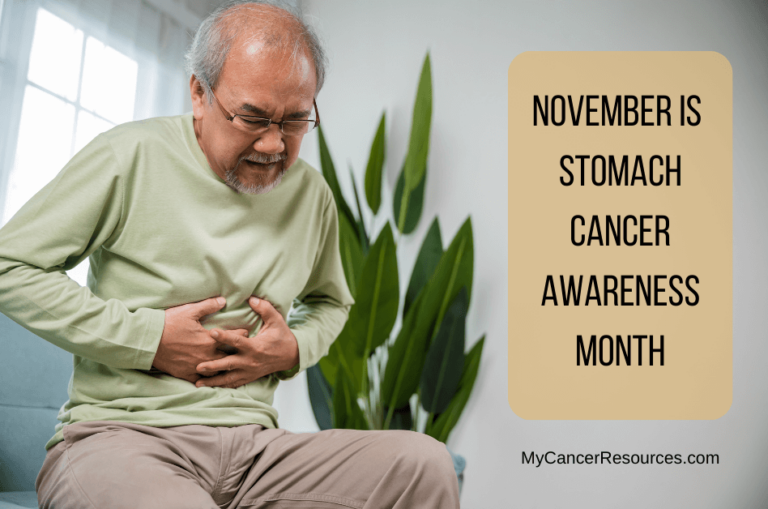
November is Stomach Cancer Awareness Month. Though rates are declining in the United States, this type of cancer is still a leading cause of death in other parts of the world. Read on to learn more about stomach cancer, also called gastric cancer.
What is Stomach Cancer?
Stomach cancer develops in the lining of the stomach and as it grows, it spreads through the three layers of tissue that make up the stomach wall.
Gastric cancer can also develop where the esophagus meets the stomach, which is called the gastroesophageal junction.
Gastric cancer is called a silent cancer, as this cancer can grow over the course of several years without clear signs or symptoms. Sometimes obvious symptoms are only noticeable once the gastric cancer has become more advanced.
Since many symptoms can be mistaken for other stomach/GI tract issues, stomach cancer is often diagnosed at later stages.
Fast Facts on Gastric Cancer
According to the National Cancer Institute, an estimated 26,500 new cases of stomach cancer will be diagnosed in the U.S. in 2023. Stomach cancer accounts for 1.4% of all new cancer cases.
Additional facts about stomach cancer include:
- The average age at diagnosis for stomach cancer is 68.
- Men are about 1.5 times more likely to develop cancer of the stomach than women.
- Though the rate of gastric cancer was already low in the United States and has been declining at a rate of about 1.5% per year here, it is still one of the leading causes of cancer-related death in other parts of the world, particularly in East Asia.
- Outside of the U.S., stomach cancer is the fifth most common cancer in the world.
Risk Factors for Developing Stomach Cancer
Risk factors for gastric cancer include:
- Ethnicity – rates are higher for Native American, African American, Pacific/Asian and Hispanic individuals compared to Non-Hispanic Whites
- Diets higher in sodium and/or contain a high amount of processed foods
- Infection with the Helicobacter pylori or h. pylori bacteria. This type of bacteria is usually passed through contact with saliva, vomit or stool, or unclean food and water.
Children can contract h. pylori and then the bacteria, which infects the stomach and if left untreated can lead to ulcers and increases the risk of stomach cancer - Occupation – stomach cancer is more common in those who work in the rubber, coal or metal industries
- Those with other stomach conditions including ulcers, acid reflux, Menetrier disease and polyps
- Family history of stomach cancer or Lynch syndrome
- Smoking and/or alcohol use
Common Signs and Symptoms of Stomach Cancer
Some common stomach cancer symptoms include:
- Nausea and/or vomiting
- Heartburn
- Feeling full after eating small amounts of food
- Abdominal bloating and/or pain
- Poor appetite
- Unintentional weight loss
- Problems swallowing
- Fatigue
- Blood in the stool
If you are experiencing any of these symptoms, especially if you are at greater risk of developing stomach cancer based on the increased risk factors mentioned above, reach out to your doctor.
They will likely get you connected with gastrointestinal specialists to evaluate your signs of gastric cancer.
With this form of cancer, early detection is key, because it is much easier to treat when caught in the early stages. There are also more treatment options available early on compared to when gastric cancer is diagnosed at more advanced stages.
How is Gastric Cancer Diagnosed?
Gastric cancer is diagnosed after an exam and a number of tests, which may include:
- Blood tests
- CT, MRI or PET scans
- Upper Endoscopy – this is where a long, flexible tube called an endoscope that has a light and video camera at one end is put into your mouth and down your throat and esophagus to your stomach to look at the inner lining of the stomach.
If there is part of the stomach that looks suspicious, like there could be precancerous growths in that area, a small amount of tissue can be removed for further testing. - Biopsy – examining the stomach tissue sample and testing it to see if there are cancer cells.
How is Stomach Cancer Treated?
After a stomach cancer diagnosis, the first treatment is typically surgery. Sometimes chemotherapy and/or radiation therapy are suggested after surgery to reduce the chances of the cancer returning.
Why is Stomach Cancer Awareness Month Important?
Gastric cancer is one of the few cancers which can be prevented with minor improvements to our diet, lifestyle changes and improving sanitation.
Stomach cancer awareness month increases awareness of gastric cancer and educates people on the risk factors and symptoms.
If more people become aware about how they can help prevent this disease, especially if they are at higher risk, maybe the likelihood of developing this cancer will continue to decrease.



